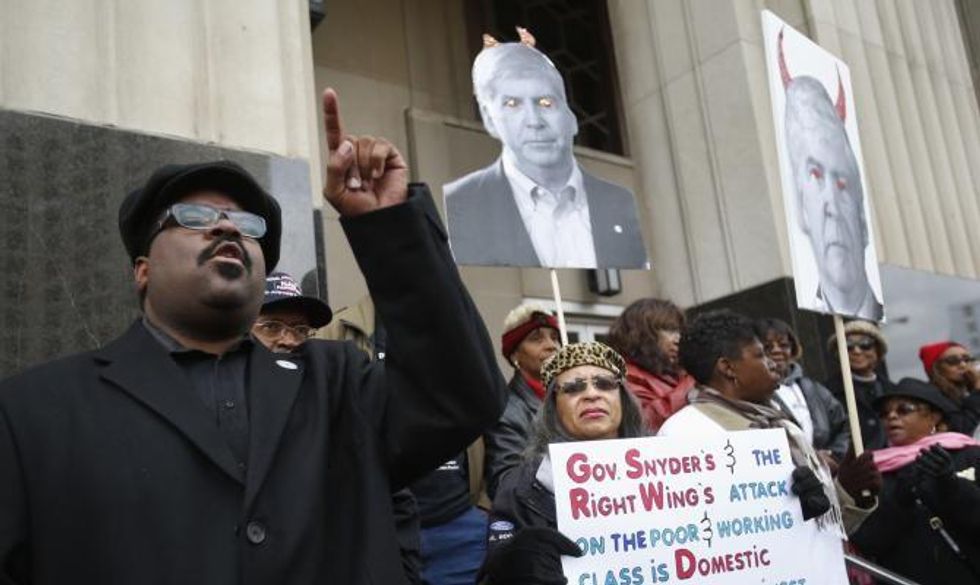News leaking out this week from the Motor City tells how the enormous gap between the pensions workers earned and the money set aside to pay for them will be closed. By stealing from the workers.
Courts, legislatures, and corporations are all working in concert not to pay the full benefits owed. For decades, political and business leaders failed to set aside the right amount of money each payday to cover the pensions workers earned and, in some cases, covered up the mismanagement of pension fund investments.
This is nothing short of theft, as pensions are simply deferred wages, that is, money that workers could have taken as cash in their regular paychecks had they not opted to set it aside.
In Detroit, a federal bankruptcy judge handling the city's Chapter 9 case held Tuesday decided he could safely ignore a Michigan Constitution provision barring any reduction in pension benefits to already retired public sector workers. Judge Steven W. Rhodes went beyond asserting the supremacy of federal law over state regulations, ruling that the pensions workers earned were a mere "contractual obligation," no different from any other bill the city owes but lacks the money to pay.
The result will mean even worse poverty in the sputtering Motown, where a once robust industrial tax base has withered away, the starkest example of the economic devastation wrought by government policies that for decades have encouraged companies to move manufacturing offshore.
Financial mismanagement in Detroit under every mayor in the past six decades also contributed to the disaster, except for the honorable exception of Coleman Young in the mid-1970s. The result: Public worker pensions averaging $19,000 a year will be cut to the bone. That is sure to increase demands for federally funded food stamps, a program which Congress has just cut, and other welfare to make up for some of pensions workers earned but will not collect.
Norman Stein, a Drexel University law professor who is an expert on pensions, said that if the Detroit order stands it will become standard practice to slash benefits.
"It would be a human catastrophe of the first order if pensions of vulnerable older workers can be cut whenever a local government goes to bankruptcy court," Stein said. "We will be consigning firemen and policemen, who did nothing wrong other than protecting the city and depending on the city's promise, into old-age poverty."
In Illinois, legislators have agreed to cut future public employees' retirement benefits by $160 billion over the next three decades. That 43 percent reduction will be achieved gradually, unlike the draconian Detroit ruling where most of the loss will be borne by current workers.
For decades, Illinois failed to invest the necessary funds each year to support the pensions it was promising. In effect, they were stealing from the workers today with a feeble promise to somehow make it up later.
If workers got only 90 cents on the dollar owed in their paychecks they would soon notice and kick up a fuss. But money not paid over to the pension plan rarely shows up on pay stubs.
Properly funded and invested, traditional defined benefit pensions are the most economical way to save for old age, combining contributions in a large pool to absorb short-term swings and the vagaries of professional investment management. They also have much lower costs than 401(K) plans. And they require a much smaller reserve against an unexpectedly long life, where the actuarial risk is concentrated in one person who must save too much or risk dire straits late in life.
But, as millions of workers are learning, the laws requiring that money be set aside and prudently invested are more loophole than safety net. This is producing not just misery for those left broke and helpless in old age, as seems about to happen in Detroit, but it is eroding trust in democratic government and the rule of law.
According to Government Accountability Office research, public employees across America may be cheated out of almost a trillion dollars, nearly half the benefits they have already earned, but not yet collected.
Private-sector workers are at risk of losing almost as much, about $840 billion, although at the moment Congress guarantees a portion of company pensions so actual losses could be much smaller.
Failing to turn money over to pension plans each pay period has become commonplace for states and local governments in the past three decades. When Republican Christie Todd Whitman became governor of New Jersey in 1994, she financed a tax cut by not funding the state employee pension plan, fulfilling her promise to that blue state's voters.
What Whitman really did was force future tax hikes or cuts in government services, but they would not come due until long after she left office in 2001 - another kind of reckless cheating on ordinary folks.
Politicians in both parties have employed similar short-funding strategies across the country. In New Orleans, bankrupt Stockton, Calif., and 3,000 other local government districts, shortfalls have been met by taking on more debt. Instead of investing money and earning interest, these feckless administrators borrowed and paid interest, magnifying taxpayer costs, Boston College researchers found.
Private-sector corporations that surreptitiously shorted worker pay by not setting aside enough money in pension plans have long found ways to cheat workers out of the benefits they earned as well as reneging on a federal guarantee that the money due in old age would be there. Even worse, Congress and the courts have approved these deals, either tacitly or directly.
One technique used to chisel workers is to replace the pension with a private annuity. If the insurer issuing the annuity goes broke, the workers collect next to nothing, as happened to textile workers in the South.
Another strategy is to convert a single-employer plan to a multi-employer plan. That reduces the federal guarantee from more than $1,000 per week to a quarter of that sum while wiping out a great deal and sometimes all of a shortfall.
Almost four decades after Congress passed the Employee Retirement Income Security Act in 1974, corporate pension plans are short by more than $800 billion worth of assets. Fifty of these plans, out of 26,000, are short by more than $450 billion.
Among the 1,475 multiemployer plans commonly used by trucking and construction companies, the shortfall is about $390 billion and 50 plans account for more than half the missing money.
When US Airways and United Airlines sought refuge in bankruptcy a decade ago they stuck the Pension Benefit Guaranty Corporation with about $9 billion of obligations. Those bankruptcies came after executives took enormous salaries, even by the already bloated standards of big companies, and pocketed their pension money in lump-sum payments.
As long as a company does not file for bankruptcy within a year, executives are allowed to keep their pension money even as more humble workers are forced to take cuts. The cuts were especially hard on pilots: Federal pension law only insures pensions at age 65 and pilots, by a law in effect at that time, had to retire at age 60, meaning they got less than 60 percent of the pension benefits they earned.
It's not as if this problem came out of nowhere. Congress and state legislatures have known about the failure to properly fund pensions since at least the 1964 collapse of Studebaker. Workers for the South Bend, Ind., carmaker who retired on a Friday that year got their pensions; those retiring the following Monday and later got nothing.
A decade later, the Employee Retirement Income Security Act became law, setting standards for how much money had to be set aside in private-sector pension plans. Before the ink from President Gerald Ford's pen had barely dried, however, corporate America started working to reduce the funding requirements.
One arcane rule after another was enacted by Congress or written into regulations that allowed companies to invest less than sound financing required.
At the insistence of Democrats, the amounts that could be put into pension plans were limited. The maximum salary that can be covered by a pension this year is $255,000.
That leaves out most of the pay to the top 1 percent of workers, who just happen to include the top executives who set the compensation for everyone below them.
Once a CEO's pension benefits became disconnected from the office worker, factory hand, and janitor, companies began emphasizing executive retirement plans that were lavishly funded. Some executives built billion-dollar fortunes tax-free.
In theory, these executive plans were risky because they lacked a PBGC guarantee. But when companies collapsed, the rank-and-file were shortchanged and sometimes wiped out of their retirement money, while executives walked away with every penny and in some cases got their retirement money doubled.
Congress did nothing to address this or subsequent reports by others, notably Ellen Schultz, whose incisive coverage of pension thievery was abruptly stopped by The Wall Street Journal just as the trend was taking off. Instead, Congress has gradually weakened worker pension protections.
Congress required companies to put away less money for many workers than good financing required because of the way the maximum salary qualifying for a pension is calculated.
A worker whose pay at the age of 30 shows that at 65 she would likely be making twice the maximum has only about half the necessary money set aside. The result is that for workers who leave an employer before age 65, too little money is set aside to cover the benefits they earned, making the overall pension pool too shallow.
Yet this scandal in the way pensions are inadequately funded is not a hot political issue. Neither party appears interested in what is of key importance to all older Americans - and should be of interest to younger ones too.
The number of hearings held by Congress this year on protecting pensions? Zero.




